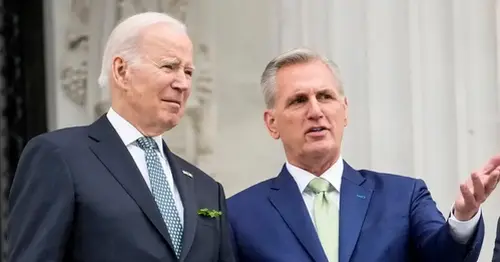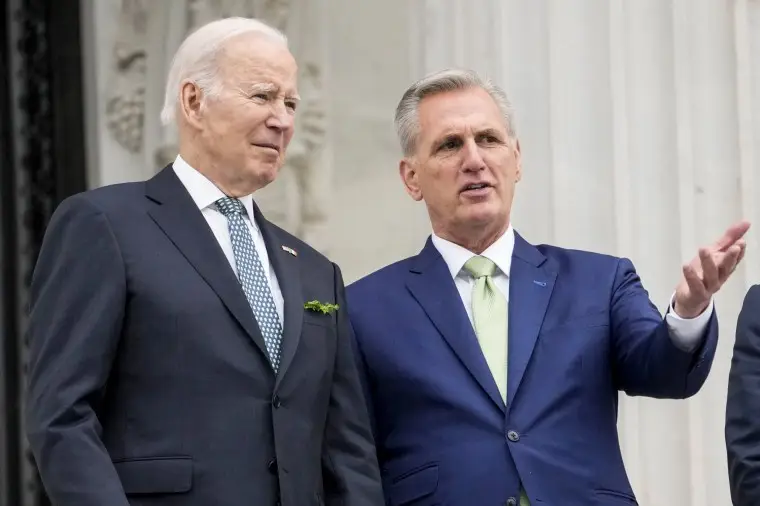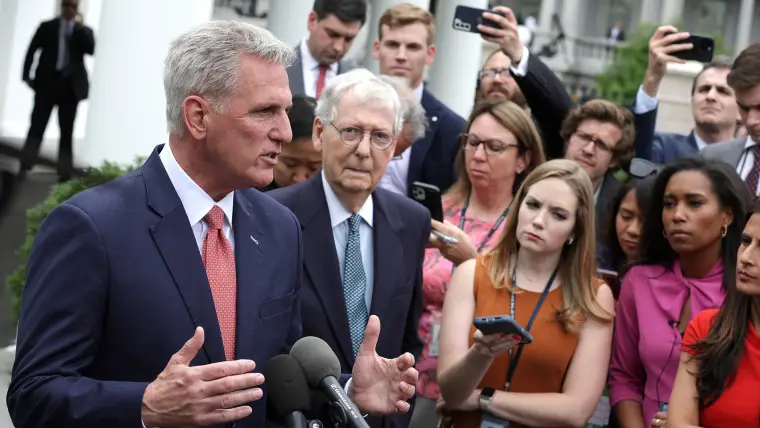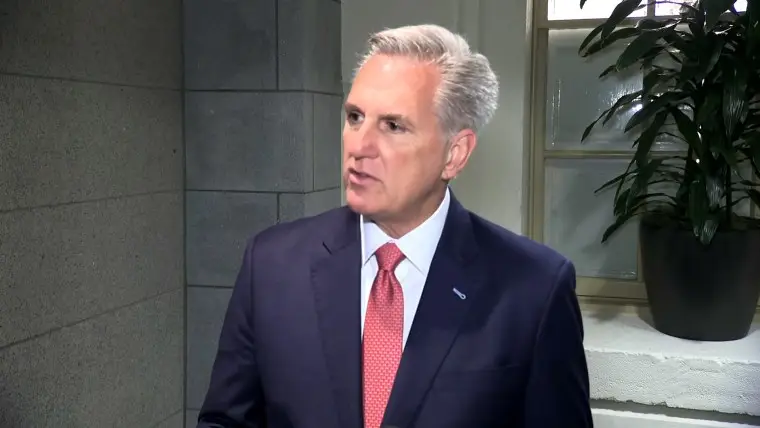
Biden and congressional leaders strike optimistic tone after debt ceiling meeting
WASHINGTON — President Joe Biden and House Speaker Kevin McCarthy met Tuesday afternoon to discuss a way to break the logjam on the debt ceiling, with fears of a self-inflicted economic calamity growing as Republicans demand spending cuts.
Leaving the meeting, congressional leaders hinted at some progress. McCarthy, R-Calif., said that the sides remain “far apart" but that “it is possible to get a deal by the end of the week.”
Failure to reach an agreement to lift the borrowing limit threatens the first-ever default on the nation’s $31.4 trillion debt, an outcome that could prove catastrophic for the U.S. economy and upend the political landscape.
McCarthy, McConnell speak after debt ceiling meeting with Biden
May 16, 202301:34The abridged timeline was front and center in remarks by congressional leaders after the sit-down. McCarthy acknowledged there is a "lot of work to do in a short amount of time" and said it was “unfortunate that we are where we are.” But he said, "If this is where we were in February ... I’d be very optimistic that we’d get this done right away.”
McCarthy praised efforts to streamline the talks, telling reporters that Biden had selected Steve Ricchetti, a close adviser to the president, and Shalanda Young, the director of the Office of Management and Budget, to negotiate directly with the speaker's team. (A White House spokesperson confirmed the selections.) On the Republican side, Rep. Garret Graves, R-La., and aides to McCarthy will take the lead, he said.
Biden is "finally" taking the advice of Senate Minority Leader Mitch McConnell, R-Ky., McCarthy added. "Appoint somebody from the president's team who can work with the speaker's team to see if we could come to an agreement," he said. "Had we done this back 97 days ago, we’d already have a bill."
Biden said there was an “overwhelming consensus” among the leaders that defaulting on the debt was not an option. That outcome would threaten a recession, devastate retirement accounts, force layoffs and deliver a blow to the nation’s reputation around the world, he said.
He said it was a “good, productive meeting,” appearing confident that default could be averted even as the clock ticks and he prepares to leave town.
Before Tuesday, the White House and Democrats had portrayed House Republicans as the only party to the talks willing to accept default as an outcome, heaping pressure on McCarthy as a holdout who risked upending the economy.
Senate Majority Leader Chuck Schumer, D-N.Y., said he was hopeful a deal could be reached as leaders coalesce behind a plan.
“We all came to agreement that we were going to continue discussions," Schumer said. “Hopefully, we can come to an agreement. We don’t have much time. But default is just the worst, worst alternative.”
The White House said that the meeting was “productive and direct” and that Biden hopes to check in with the leaders by phone while he is traveling overseas this week and to meet with them again when he returns.
Biden leaves for Japan on Wednesday to attend a summit of the Group of Seven major industrial countries. With talks continuing and a deal not yet within reach, the White House said Tuesday that Biden would cut his trip short and return Sunday.

The White House expects staff-level talks will continue while Biden is overseas, and he will be briefed daily while traveling, a source familiar with the negotiations said.
White House officials said before the meeting that they did not expect any kind of completed framework, a source familiar with the discussions said. One area of contention is GOP demands to impose tougher work requirements for federal aid programs, which faces Democratic pushback.
The House-passed proposal, negotiated among GOP members and approved on party lines, would require able-bodied adults up to age 55 to work a minimum of 20 hours per week or satisfy other criteria to get food stamps for more than three months every three years.
But staffers have identified potential areas of common ground in daily talks over the last six days, including reform of permitting for energy and infrastructure projects and the possibility of negotiating spending cuts on a parallel track to raising the debt ceiling.
McCarthy had sounded a pessimistic tone Monday, saying: "I don’t think we’re in a good place. I know we’re not.”
Treasury Secretary Janet Yellen said in a letter Monday that the U.S. is still projected to exhaust all options to keep paying the country’s bills as early as June 1, leaving Congress with less than three weeks to avert a potential worst-case scenario.
In remarks before the meeting Tuesday, Yellen stressed the urgency of striking a deal and warned of stark economic implications “if Congress has not acted to address the debt limit by early June, and potentially as early as June 1.”
McCarthy on debt limit: ‘It’s not a revenue problem. It’s a spending problem’
May 16, 202301:43“It’s impossible to predict with certainty the exact date when Treasury will be unable to pay off the governments bills,” she said at the Independent Community Bankers of America’s 2023 Capital Summit.
Biden and congressional leaders were originally scheduled to meet last Friday but pushed the meeting to Tuesday to give staff-level negotiators more time to develop a framework for the principals to discuss.
The group, which includes McCarthy, Schumer, McConnell and House Minority Leader Hakeem Jeffries, D-N.Y., met last Tuesday and included Vice President Kamala Harris for the first time. Since last week, White House and Capitol Hill staffers have held private meetings to consider a path forward, but they have been tight-lipped about the details of the negotiations.
Schumer insisted Monday that default must “be off the table.”
“Speaker McCarthy must commit to the same,” he said. “The consequences of default are too terrible.”
Biden, who has been reluctant to characterize the talks while they are ongoing, said last week he is “certain” default can be averted, and he remained hopeful over the weekend.
“I remain optimistic because I’m a congenital optimist, but I really think there’s a desire on their part as well as ours to reach agreement,” Biden said Sunday. “I think we’ll be able to do it.”
The Republican-led House is demanding spending cuts and policy changes to lift the debt ceiling. Biden and the Democratic-controlled Senate insist that paying the bills is nonnegotiable and that next year’s budget should be dealt with separately.
Pressure to reach a deal is growing.
The debt ceiling bill passed by House Republicans would cut the budget to fiscal year 2022 levels, slashing $131 billion from current spending. Democrats want to increase spending on health care, education and other domestic priorities, leaving the two sides to find other avenues for spending cuts; one possibility Biden and Republicans have floated is pulling back unspent Covid funds. Another possibility is reforms that would speed the process of getting permits for energy projects backed by the White House and centrist Sen. Joe Manchin, D-W.Va.








